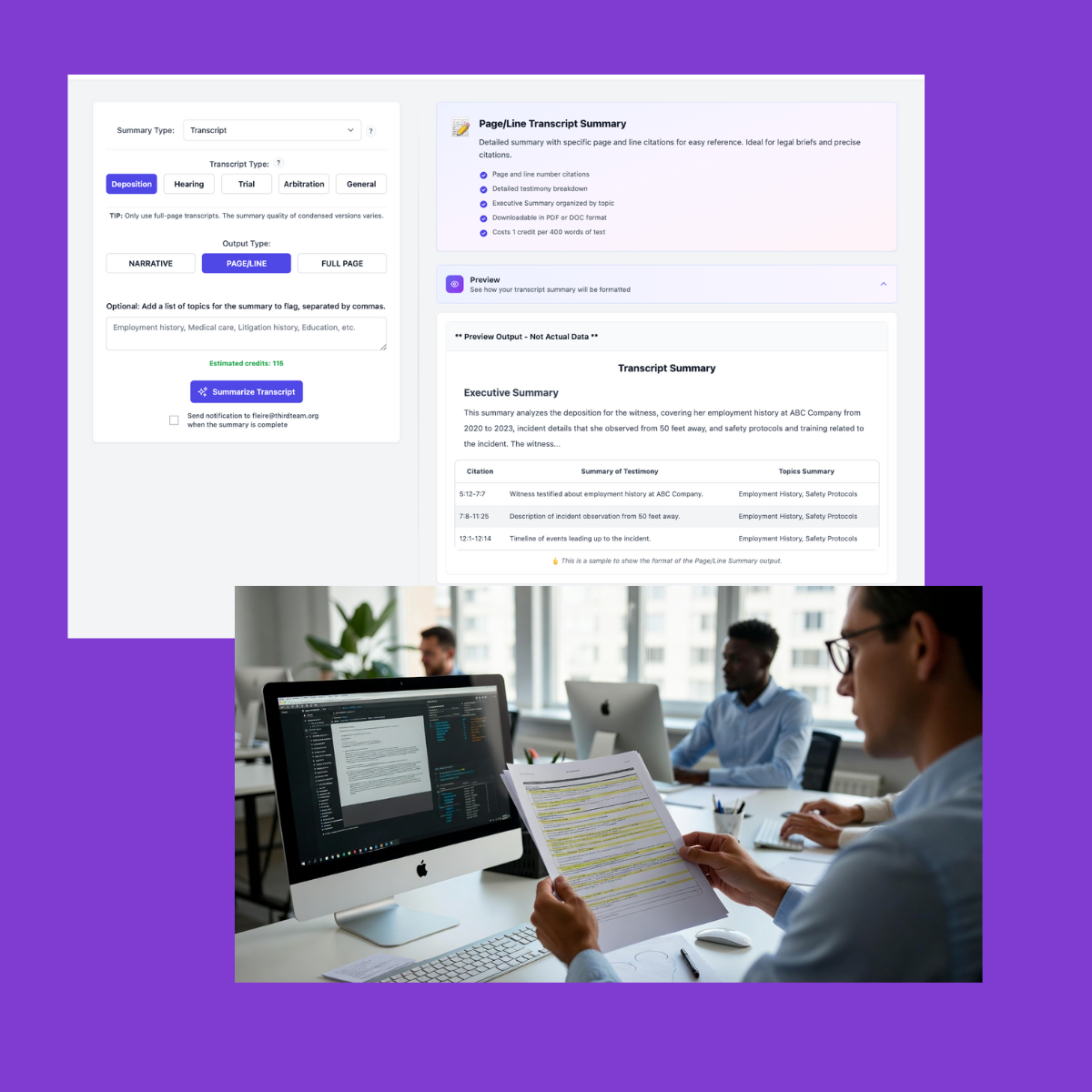
How to Write Winning Deposition Summaries: Dodonai's Comprehensive Guide

Deposition summaries are an indispensable part of the litigation process, offering a streamlined way to access and understand the voluminous details captured during depositions. A well-crafted summary can significantly enhance a legal team's efficiency, providing quick references to crucial testimony and aiding in case strategy development. Dodonai's comprehensive guide is designed to help you craft winning deposition summaries, leveraging the latest in legal tech to optimize your process.
What is a Deposition?
A deposition is a sworn, out-of-court oral testimony of a witness that is recorded for later use in court or for discovery purposes. It allows both parties in a lawsuit to gather information related to the case, helping them prepare for trial by revealing what witnesses will say and how they will say it. For a comprehensive guide on understanding depositions, start here.
What is a Deposition Summary?
A deposition summary condenses hours of testimony into a digestible format, highlighting the most pertinent information for quick reference. It distills the essence of what was said, preserving the factual backbone of the deposition without the extraneous detail found in full transcripts.
Start with Why - Understanding the Value
Before diving into summarization, it's crucial to understand the "why" behind your summary. Are you drafting it to assist a colleague in grasping the key points quickly? Or perhaps to highlight specific testimony relevant to motion drafting or trial preparation? The intended use of the summary dictates its form and content, ensuring it meets the specific needs of its audience. For more on the value that deposition summaries provide, check out our post here.
Be sure to discuss the goals of the summary with your team and whomever you are drafting it for. What are their goals for the summary? Do they have any specific preferences for the wording, issues, and/or format?
Determine the Type of Summary to Create
- Narrative Summary: Provides a detailed, continuous account of the deposition, focusing on the story and substance of the testimony. Ideal for complex cases where understanding nuances and interactions is key.
- Page-Line Summary: Cites specific page and line numbers alongside brief descriptions of the testimony. This format is perfect for legal teams needing to reference exact locations in the transcript for detailed review or cross-examination. Learn more about drafting page-line summaries here.
- Issue-Based Summary: Organizes testimony around key case issues, making it easier to locate all relevant information on a particular topic. It's particularly useful in cases with distinct themes or when preparing for thematic cross-examination. Learn more about drafting issue-based summaries here.
More Tips for a Great Summary
- Be Concise but Comprehensive: Strive to include all relevant facts while eliminating unnecessary detail. Every sentence in the summary should add value.
- Remain Objective: Your summary should be unbiased, focusing solely on the information presented without inferring guilt, innocence, or intent.
- Use Clear Formatting: Adopt a consistent format that suits the summary's purpose, whether it's narrative, page-line, or issue-based, making it easy for readers to find what they need.
- Review for Accuracy: Ensure your summary accurately reflects the testimony. Misrepresenting testimony, even unintentionally, can have significant implications.
- For more expert tips, check out our post on crafting effective deposition summaries here.
- Check out some deposition summary examples with corresponding transcripts here.
How Dodonai's Summarizer Can Help
Dodonai's AI-powered deposition summary services revolutionize the process of creating deposition summaries. Here’s how:
- Efficiency at Scale: Process hours of testimony in minutes, freeing up legal teams to focus on analysis and strategy rather than manual summarization.
- Customizable Summaries: Whether you need a narrative, page-line, or issue-based summary, Dodonai's technology can adapt to your specific requirements, ensuring you get the summary that best fits your case strategy.
- Precision and Consistency: Leveraging advanced AI, Dodonai ensures that every summary is accurate, objective, and consistently formatted, reducing the risk of human error.
Crafting effective deposition summaries is both an art and a science. With Dodonai's comprehensive guide and cutting-edge technology, legal professionals are equipped to produce high-quality summaries that enhance their litigation efforts. By understanding the purpose, selecting the appropriate type, and employing best practices in summary creation, you can ensure that your summaries are not just documents, but strategic tools in your legal arsenal.
Try Dodonai Free











.png)














